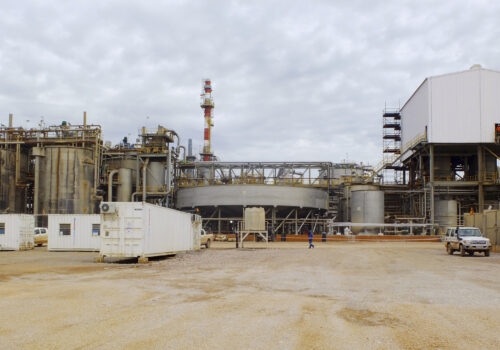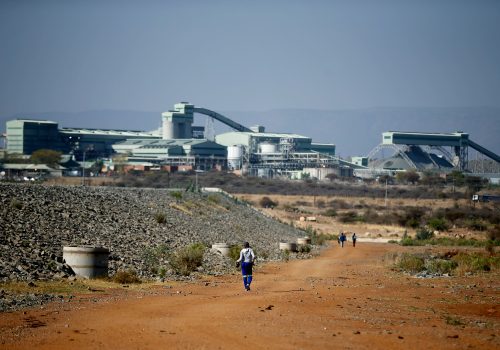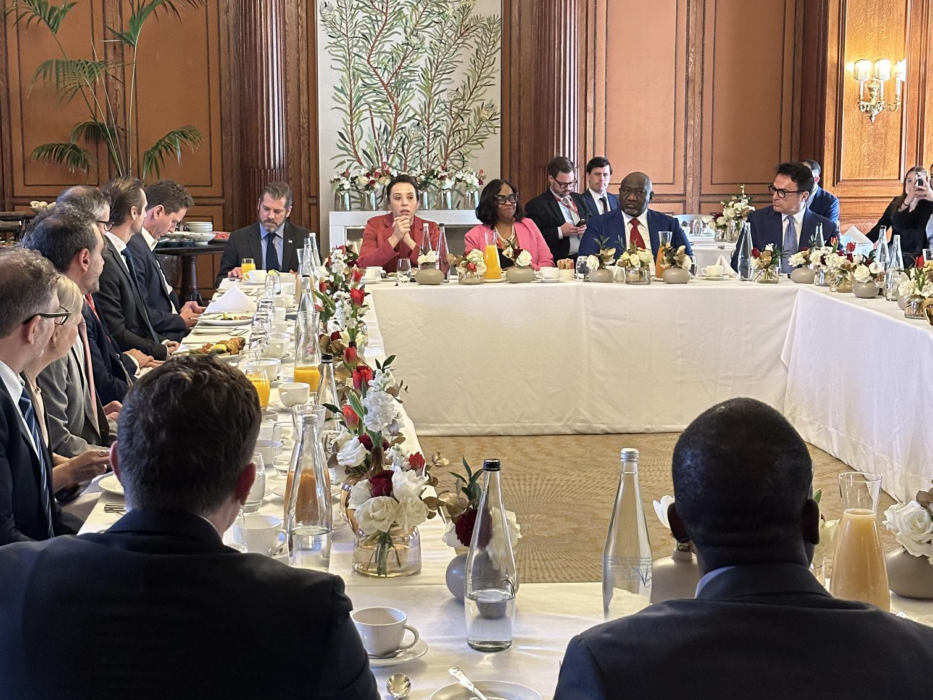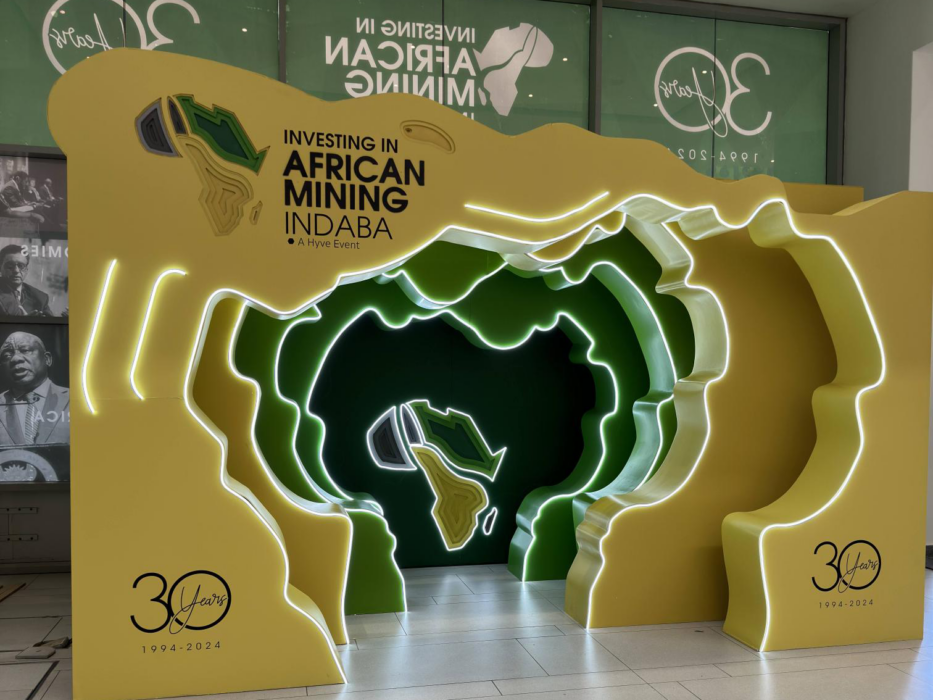About the task force
Home to over 30 percent of the world’s known reserves of critical minerals, African countries have a central role to play in the supply chains of essential twenty-first-century industries, particularly electric vehicles, lithium batteries, cellphones, medical scanners, and military hardware. The energy transition and economic competitiveness in developed economies depend on their ability to secure a supply of these minerals, sustain innovation, and create mutually beneficial partnerships with source nations.
The Atlantic Council’s Africa Center, in partnership with Aiteo Group, launched its Critical Minerals Task Force on February 7, 2024, at the thirtieth annual Mining Indaba conference in Cape Town, South Africa. The Task Force serves as a leading platform for research, discussion, and briefings on the burgeoning critical mineral partnership between African countries and the United States.
As part of its work on critical minerals, the Africa Center publishes regular reports, issue briefs, and op-eds on topics of interest surrounding the mining industry in Africa.
African Critical Minerals Roadmap
Eight investment priorities for the US government in 2025
Published May 15, 2025
Based on the discussions the Africa Center has held with policymakers, private-sector leaders, and development finance institutions since establishing the Critical Minerals Task Force, we at the Center believe the following moves to expand US critical minerals partnerships with African countries could garner consensus and should be prioritized.
1. Map the US government resources available for investing in critical mineral supply chains
A myriad of US government agencies and investment tools, consisting of unclear and overlapping authorities, presents a complicated ecosystem for investors, firms, and project developers to navigate. The US government should clearly define what government resources are available for de-risking investment in critical mineral supply chains throughout the project finance life cycle that is typical for mining and infrastructure. The mapping of available US government grant resources for feasibility studies, risk equity, and various debt and insurance products will reduce information-gathering and coordination costs for stakeholders, thereby accelerating the formation of US-Africa partnerships. It will also encourage coordination across the twenty-plus relevant US agencies tasked with developing critical mineral supply chains to strengthen national security and competitiveness.
2. Complete this mapping in sixty days
The National Energy Dominance Council, housed in the Executive Office of the President, should direct a lead agency or organization to complete this mapping and make it available to US firms and investors through a website that requires registration and basic Know Your Customer due diligence. Some possible candidates for taking the lead on the mapping include the Department of Commerce, which houses a Supply Chain Center; the Critical Minerals Forum, which is funded by the Defense Advanced Research Projects Agency; the Department of Defense’s Office of Strategic Capital (OSC); the US Export-Import Bank’s (EXIM’s) Supply Chain Resiliency Initiative; and the US International Development Finance Corporation (DFC).
3. Forge partnerships with African development finance institutions (DFIs), banks, and private sector partners to fill gaps in US de-risking and financing capacities
Currently there is a significant gap in support for early-stage feasibility studies and capabilities regarding risk in equity investment within the US government. As was done in the Lobito Corridor project—when the DFC partnered with the African Finance Corporation (AFC) to do project development—the DFC, EXIM, and OSC should partner with AFC and other African DFIs and regional banks with staff on the ground in key countries. Working with partners that have experience in mining and infrastructure development would allow greater flexibility in managing financial products. These mutually beneficial partnerships can effectively de-risk critical mineral projects and shorten the long and costly learning curve the United States faces in investing in the sector, given Chinese dominance over the last two decades. Savings generated by pensions, government bonds and diaspora communities should be leveraged to meet financing goals namely ensuring adequate transfer of skills, energy links and agribusiness development to fight rural exodus.
4. Make investment in critical mineral corridors in African markets a pillar of the US government’s strategic approach
The Trump administration can learn from the Lobito Corridor project to stimulate the mineral sector and assist in economic diversification and growth, namely ensuring adequate transfer of skills, energy links and agribusiness development to fight rural exodus. With a focus on mineral-resource corridors, the US government can leverage transport facilities and existing infrastructure to create new models for US-African DFI partnerships aimed at developing critical mineral corridors in Africa for mutual benefit. One such potential corridor could run between Dakar and Lagos, along the Gulf of Guinea coastline. Others could include corridors close to existing mine sites such as those in southern Africa. The proposal outlined by the Trump administration to move the Millennium Challenge Corporation and US Trade and Development Agency under the DFC could reduce redundancy and thus position the administration to accelerate corridor projects. It could thus avoid the slow pace seen during the Biden administration, from the Democratic Republic of the Congo-Zambia memorandum of understanding, which was signed in December 2022, to the commitment of financing by the DFC in cross-border mineral-resource corridors. The Millennium Challenge Corporation’s capacity for regional compacts can help the DFC fast track cross-border economic integration and coordination and lend immediate scale to future mining-corridor projects.
5. Reauthorize the DFC with greater flexibility and risk tolerance
With the deadline for reauthorization approaching in October 2025, administration officials should strongly advocate for an upgraded DFC, or a DFC 2.0, with Congress. They also should clarify plans for the DFC in relation to the newly announced intent to create a US sovereign wealth fund. Building on the White House’s Immediate Measures to Increase American Mineral Production, an executive order issued March 20 which gives the DFC the ability to invest domestically, the administration should advocate for greater flexibility on geographic mandates, address equity scoring issues, and institutionalize a risk-taking culture at the DFC. The agency enjoys bipartisan support, and current congressional reauthorization efforts include a doubling of the DFC’s maximum contingent liability, or the highest amount the DFC could take on in liabilities. Members of Congress should also accelerate the confirmation process for DFC leadership given the agency’s leading role in advancing stronger US-African critical mineral value chains.
6. Invest in engineering and mining exchange and training programs
In 2023, the number of African students studying in China was nearly 82,000: almost twice the number of African students who studied in the United States. China has set up programs intended to bring Africa’s business and political elite to China for trainings and exchanges, while simultaneously helping build business networks globally. To counter this influence, the US government should expand educational exports by increasing access to education for African students, with a focus in mining and chemical engineering. The Trump administration can leverage the Department of State’s International Visitor Leadership Program, Fullbright Program, Office of Science and Technology Cooperation programs, and the International Trade Administration’s SABIT leader program to build a targeted and meaningful effort to train the next generation of African mining leaders. The administration can partner with specialized universities such as the Colorado School of Mines, the University of Alaska at Fairbanks, and the South Dakota School of Mines and Technology.
7. Prioritize commercial diplomacy through the US diplomatic presence in Africa
After two decades of weak commercial diplomacy in African markets, the US Department of Commerce should strengthen the country’s commercial presence on the African continent through the deployment of additional foreign commercial service officers. It also should coordinate the work of US foreign service economic and trade officers and technical experts from relevant agencies including the US Geological Survey and the DFC. The Department of State should consider a reduction in the number of political officers and bolster the number of economic and trade officers with a greater focus on providing business-matchmaking services, guidance, and investment advice about the tools the US government can offer to investors to de-risk projects and make better, faster, and more informed decisions. Given its hiring freeze and effort to reduce government payroll, the Trump administration should consider the creation of a volunteer business corps.
8. Harness US dominance in technology, particularly in artificial intelligence, to accelerate the development of mining opportunities
Given the strong ties between the Trump administration and technology leaders in Silicon Valley, the administration should mobilize tech expertise to create, commercialize, and scale solutions for systemic challenges in the African mining sector, such as a lack of reliable data and mapping. While doing so, it should carve out a central role for the US Geological Survey. In addition, the President’s Council of Advisors on Science and Technology should lead a delegation to Africa in 2025 with senior government and private-sector leaders, similar to the tours led by 42Geeks (formerly Geeks on a Plane). This delegation should visit strategic projects in key countries and announce significant investments with African counterparts to expand the investment, tech, and mining ecosystem.
Op-ed series
Explore our articles mapping out the latest in the critical minerals sector in Africa.
Reports
Learn more from our research and reports on the critical minerals sector in Africa.
Photos
The Task Force regularly hosts private briefings on emerging trends in the critical minerals sector in Africa. Events have included a briefing to the African diplomatic corps in Washington, DC, on investments and ‘Asian and African outlooks on critical minerals’ hosted on the sidelines of the UN General Assembly 2024.
Stay connected
Contact us
Email Sibi Nyaoga to learn more and get involved
With support from

Presented by

The Africa Center works to promote dynamic geopolitical partnerships with African states and to redirect US and European policy priorities toward strengthening security and bolstering economic growth and prosperity on the continent.

































Follow the series on X/Twitter with @ACAfricaCenter using #AfricasTimeHasCome